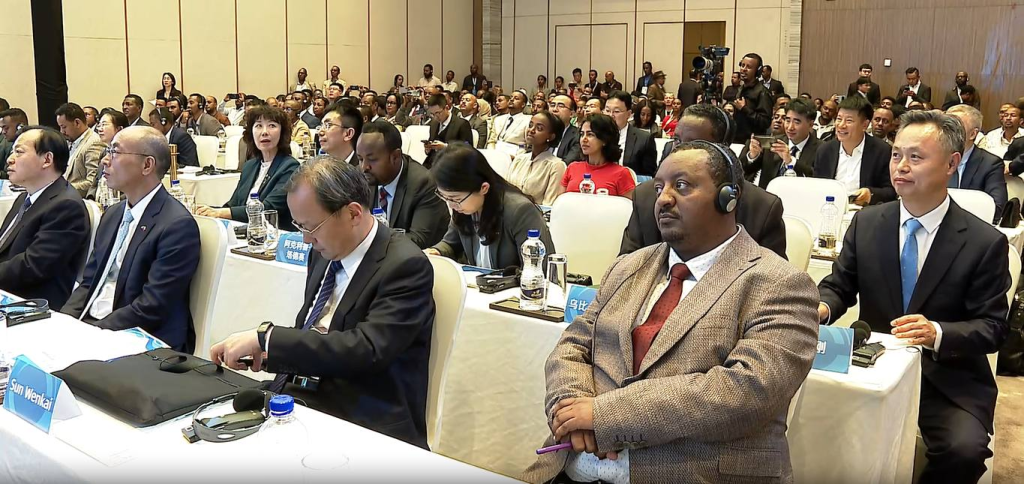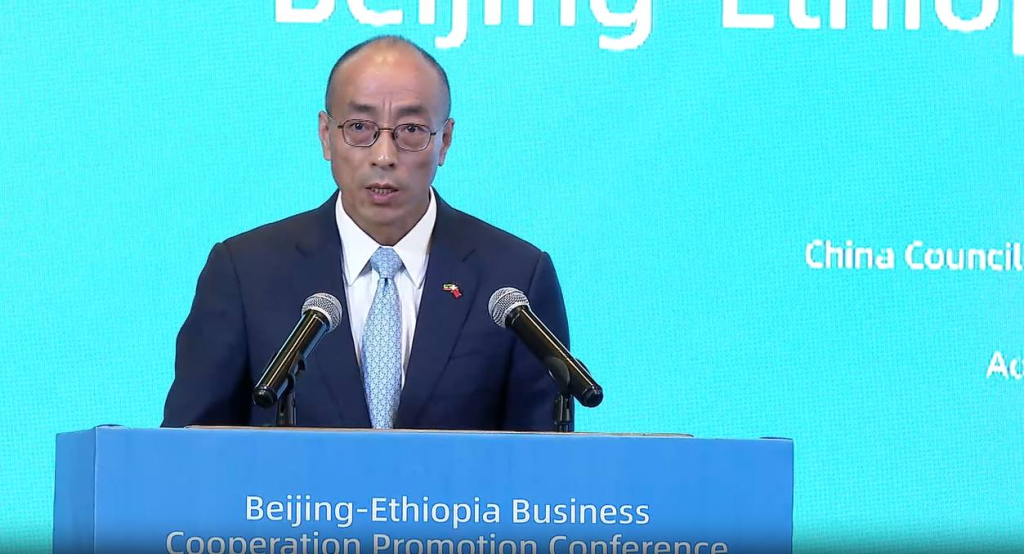
Officials from Ethiopia and China have outlined great potential for economic cooperation between the two countries’ business communities.
The Ethio-China Business Cooperation Promotion Conference in Addis Ababa today underscored the vast potential for economic collaboration between Ethiopia and China.
It was indicated that the conference brought together over 200 participants, representing businesses from both nations to explore opportunities to strengthen economic ties.
In his opening remarks, Industry State Minister, Hassan Mohamed highlighted the unique opportunities to deepen Ethio-China mutual ties for growth.

For him, the conference is a significant milestone to open doors for a deepening era of cooperation, bilateral relations, and mutual economic growth. Ethiopia is implementing structural reforms to adjust its macroeconomic imbalance which has resulted in market insufficiencies, he elaborated.
To address the challenges permanently and ensure sustainable economic growth, the state minister pointed out that enhanced agricultural productivity and manufacturing a key drivers of structural transformation.
“Our efforts also focus on building strong background linkage by improving the production of agriculture, and agricultural inputs, encouraging large-scale commercial production of agro-inputs, and fostering stronger connections between agriculture and industrial parks.”
According to him, this presents Chinese investors with lucrative opportunities to invest in agro-processing industries and related infrastructures tapping into Ethiopia’s vast agricultural potential to support a robust manufacturing base.
The government is committed to enhancing productivity among firms and workers through incentivizing, upgrading technical and vocational training programs, improving working conditions, and developing robust industrial relations, he reaffirmed.
Accordingly, these bold measures of the government would benefit the Chinese companies operating in Ethiopia from a productive workforce supported by training programs, and affordable labor practices.
He also mentioned the Ease of Doing Business initiatives that the government has been recently deepening. According to Hassan, the initiatives address cross-cutting challenges, including the business licensing process, logistics hurdles, and the power supply, strengthening policy and regulatory support.
The ministry is also creating more conducive environments for manufacturing enterprises. “Chinese investors will discover an increasingly streamlined and supportive business climate, reducing operational risks and costs,” he said.
As the government is recently fostering effective public-private dialogue mechanisms, the state minister said it creates an avenue for Chinese firms to engage in collaborative research and development.
Moreover, the state minister recalled that the Council of Ministers of Ethiopia recently approved a new industrial policy and this policy provides a comprehensive framework to guide the efforts in transforming the manufacturing industry.
“For the Chinese investors, this policy framework ensures a stable, predictable, and supportive environment, facilitating long-term investment and growth.”
He also mentioned the “Made in Ethiopia” national movement to address the challenges faced by manufacturers to boost productivity create job opportunities and increase the sector’s contribution to GDP.
“This initiative aligns with our national manufacturing industrial policy and 10-year development plan aimed to overcome challenges in Ethiopia’s manufacturing sector and generate positive impacts on related sectors.”
Within the Ministry of Industry, we have prioritized several initiatives to support the manufacturing sector. This includes our industry linkage strategy, performance-based package, import substitution strategy and implementation, export promotion, capacity utilization, support Project raw material facilitation, domestic investors’ attraction, aftercare of service, and investment problem solving, he pointed out.
“Chinese investors can take advantage of targeted incentives, robust support system, under proactive government engagement.”
He also invited esteemed representatives of Chinese enterprises to explore this opportunity and forge partnerships that will unlock the full potential of our shared vision for economic prosperity.
“Together, we can contribute to the growth and transformation of our economies, create jobs, and improve the lives of our people.”
Finally, he urged all stakeholders to seize the historic opportunity and work hand in hand to build a future of shared prosperity, innovation, and sustainable development.

Councillor of China’s Embassy in Ethiopia, Yang Yihang expressed his firm belief that there will be great potential for cooperation between China and Ethiopia in the future.
“We believe there will be great potential for future cooperation between China and Ethiopia.”
The councilor pointed to agriculture, biotech, infrastructures, digitization, and industrial parks as great potential for cooperation between the countries.
The investment of Chinese enterprises in Ethiopia has been growing, creating hundreds of thousands of job opportunities across the country, he noted.
Source: ENA
